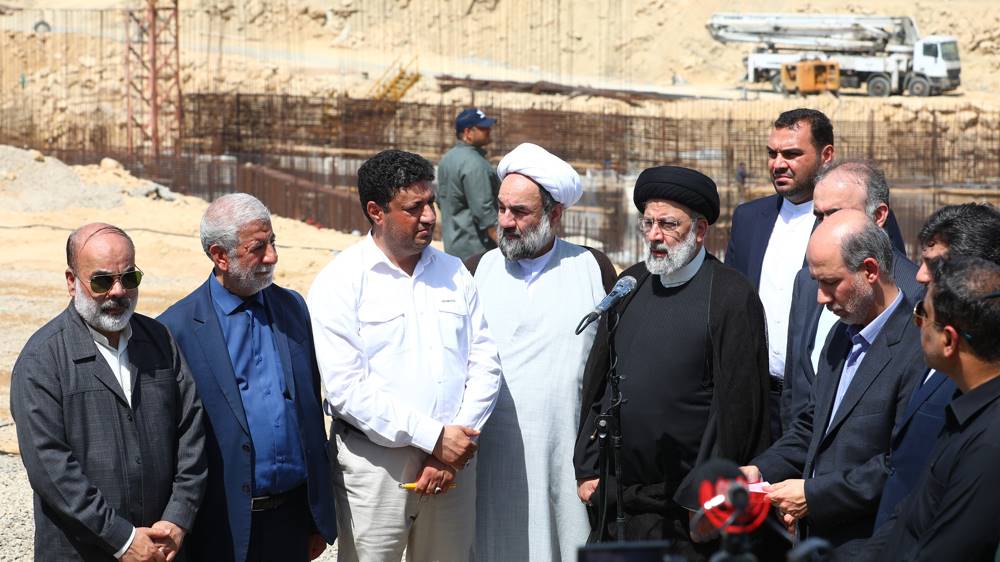Iran’s President Ebrahim Raisi has delivered a warning to the Taliban stating that Afghanistan must respect its water rights and immediately provide Iran with its share of water.
Speaking to reporters during a visit to Sistan and Baluchestan on Thursday, Raisi delivered a warning to “the Afghan authorities and rulers”, saying: “I’d remind the rulers of Afghanistan that they should not regard our demand as being ordinary and must take it very seriously,” the president added.
On reports that Kajaki Dam in southern Afghanistan does not contain much water and that it is filled with sludge, the president said Afghanistan should allow Iranian experts to immediately assess the situation.
There will be no debate if Iranian technicians confirm that the dam in Afghanistan lacks water, but if there is water, Iran will by no means allow the right of its citizens to be violated, he warned.
The president also assured the people of Sistan and Baluchestan that Tehran is working hard on a project to transfer water from the Sea of Oman, adding, however, that the plan will be time-consuming.
Iran and Afghanistan have been locked in a protracted dispute over the water of the Helmand River, also referred to as the Hirmand River, which originates in the Hindu Kush Mountains near Kabul and flows 1,126 kilometers south before flowing into Hamoun wetlands, located in Iran’s Sistan and Baluchestan.
The two countries signed a water-sharing accord on the Helmand River in 1973, under which Afghanistan pledged to deliver an average of 820 million cubic meters of water per annum to Iran.
Iran has repeatedly criticized Afghanistan for failing to honor the agreement and the lake has reportedly dried up.
The issue of water rights has gathered momentum in the past month, after Iran’s Foreign Minister Hossein Amir-Abdollahian raised the issue with the Taliban’s foreign minister Amir Khan Muttaqi in Uzbekistan a month ago.
At the time, Amir-Abdollahian tweeted that he “emphasized in detail” the issue of Iran’s claim on the Helmand River.
The Afghan side, he added, “also emphasized its commitment to Iran’s water rights” and both sides “agreed to take immediate action” in this regard.
Raisi also spoke to the Taliban’s foreign minister Amir Khan Muttaqi by phone recently. “Releasing water from Afghanistan and supplying Iran’s water rights in a practical way is a serious demand of the Islamic Republic of Iran, and this has an impact on relations between the two sides,” he said.
Last July, Amir-Abdollahian warned Muttaqi that the unresolved water dispute could affect cooperation between the two countries, describing it as an “important index” of the Taliban government’s commitments.
Meanwhile, at a Cabinet meeting this week, Raisi tasked the ministries of foreign affairs and energy as well as the special envoy for Afghanistan affairs, Hassan Kazemi Qomi, to “seriously pursue” the matter, terming it an “important issue.”
Then in an interview with state TV on Tuesday, Qomi said the issue is being pursued with Afghan authorities and “will be settled this year.”
“The issue of the (1973) treaty is a legal issue, to which the Afghan government is committed and has declared its adherence. It must also implement the treaty,” he added.
He said only 27 million cubic meters of water reached Iran last year compared to the 820 million cubic meters Iran is entitled to under the water-sharing treaty.
In separate remarks on Tuesday, Iranian Energy Minister Ali Akbar Mehrabian said the government is taking “serious steps” to ensure proper implementation of the treaty.
Taliban Energy Minister Matiullah Abid, meanwhile, has said that Kabul is “committed to the treaty” with Iran, adding that water was allocated to Iran last year “based on the treaty.”





